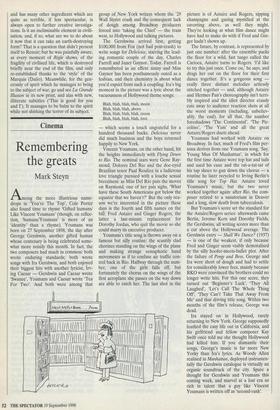Cinema
Remembering the greats
Mark Steyn
Anong the more illustrious name- drops in 'You're The Top', Cole Porter also found time to rhyme 'Gifted humans/ Like Vincent Youmans' (though, on reflec- tion, 'humans/Youmans' is more of an `identity' than a rhyme). Youmans was born on 27 September 1898, the day after George Gershwin, another gifted human whose centenary is being celebrated some- what more noisily this month. In fact, the two composers had much in common: both wrote enduring standards; both wrote songs with Ira Gershwin, and both enjoyed their biggest hits with another lyricist, Irv- ing Caesar — Gershwin and Caesar wrote `Swanee', Youmans and Caesar wrote 'Tea For Two'. And both were among that group of New York writers whom the '29 Wall Street crash and the consequent lack of dough among Broadway producers forced into 'taking the Chief — the train west, to Hollywood and talking pictures.
The Gershwins arrived first, getting $100,000 from Fox (not bad post-crash) to write songs for Delicious, starring the lead- ing romantic couple of the day, Charles Farrell and Janet Gaynor. Today, Farrell is remembered as an effete ninny and Miss Gaynor has been posthumously outed as a lesbian, and their chemistry is about what you'd expect from such a coupling. Ira's big moment in the picture was a lyric about the vacuousness of Hollywood theme songs:
Blah, blah, blah, blah, moon Blah, blah, blah, above Blah, blah, blah, blah, croon Blah, blah, blah, blah, love
— which seems a touch ungrateful for a hundred thousand bucks. Delicious never did much business and the boys returned happily to New York.
Vincent Youmans, on the other hand, hit the heights immediately with Flying Down to Rio. The nominal stars were Gene Ray- mond, Dolores Del Rio and the doe-eyed Brazilian tenor Paul Roulien in a ludicrous love triangle pursued with a louche sexual breeziness: as Miss Del Rio puts the moves on Raymond, one of her pals sighs, 'What have these South Americans got below the equator that we haven't?' But the only rea- son we're interested in the picture these days is the fourth and fifth names on the bill: Fred Astaire and Ginger Rogers, the latter a last-minute replacement for Dorothy Jordan, who quit the movie so she could marry its executive producer.
Youmans's title song is thrown away on a famous but silly routine: the scantily clad chorines standing on the wings of the plane and making strange semaphoric hand movements as if to confuse air traffic con- trol back in Rio. Halfway through the num- ber, one of the girls falls off, but fortunately the chorus on the wings of the first aeroplane she passes on the way down are able to catch her. The last shot in the picture is of Astaire and Rogers, sipping champagne and gazing mystified at the cavorting above, as well they might. They're looking at what film dance might have had to make do with if Fred and Gin- ger hadn't shown up.
The future, by contrast, is represented by just one number: after the ensemble packs the floor for a wild, fast tango called the Carioca, Astaire turns to Rogers. 'I'd like to try this just once. Come on,' he says, and drags her out on the floor for their first dance together. It's a gorgeous song really three distinct melodies artlessly stitched together — and, although Astaire and Hermes Pan's choreography isn't terri- bly inspired and the idiot director crassly cuts away to audience reaction shots at all the worst moments (including, unbeliev- ably, the end), for all that, the number foreshadows 'The Continental', 'The Pic- colino', 'The Yam' and all the great Astaire/Rogers duets ahead.
Youmans had worked with Astaire on Broadway. In fact, much of Fred's film per- sona derives from one Youmans song, 'Say, Young Man Of Manhattan', in which for the first time Astaire wore top hat and tails and used his cane and the rat-a-tat-tat of his tap shoes to gun down the chorus — a routine he later recycled to Irving Berlin's title song for Top Hat. Astaire loved Youmans's music, but the two never worked together again: after Rio, the com- poser retired to a sanatorium in Denver and a long, slow death from tuberculosis.
But Youmans's score set the standard for the Astaire/Rogers series: afterwards came Berlin, Jerome Kern and Dorothy Fields, the Gershwins, all writing scores more than a cut above the Hollywood average. The Gershwin entry — Shall We Dance? (1937) — is one of the weakest, if only because Fred and Ginger seem visibly demoralised by the silly hoofer-meets-ballet plot. After the failure of Porgy and Bess, George and Ira were short of dough and had to settle for considerably lower fees, mainly because RKO were convinced the brothers could no longer write hits. For this one score, they turned out 'Beginner's Luck', 'They All Laughed', 'Let's Call The Whole Thing Off', 'They Can't Take That Away From Me' and that driving title song. Within two months of the film's release, George was dead.
Ira stayed on in Hollywood, rarely returning to New York. George supposedly loathed the easy life out in California, and his girlfriend and fellow composer Kay Swift once told me she thought Hollywood had killed him. If you dismantle their songs, George's music is far more New Yorky than Ira's lyrics. As Woody Allen realised in Manhattan, deployed instrumen- tally the Gershwin catalogue is virtually an organic soundtrack of the city. Spare a thought for Gershwin and Youmans this coming week, and marvel at a lost era so rich in talent that a guy like Vincent Youmans is written off as 'second-rank'.










































































 Previous page
Previous page